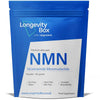What exactly is NMN?
NMN stands for nicotinamide mononucleotide, a organic molecule present in all species. For the molecular level, it’s a ribonucleotide, a simple structural unit with the nucleic acid RNA. It consists of a nicotinamide group, a ribose, plus a phosphate group.

NMN can be a precursor of nicotinamide adenine dinucleotide (NAD+), a molecule which may be attractive scaling down some aspects of aging. NAD+ serves many critical functions inside our cells, like electron transport, cell signaling, and DNA repair.
Accumulating evidence points too as our bodies age, our numbers of NAD+ decline, increasing our chance of age-related diseases.
That’s where the NAD+ precursor NMN will come in. Some researchers believe if we can restore that lost NAD+, we will not merely decrease aging but also delay various age-related diseases. Regardless of whether restoring NAD+ metabolism in humans will slow aging or support healthy longevity continues to be an unanswered question, though the animal details are promising.
What foods contain NMN?
NMN are available naturally in foods including avocado, broccoli, cabbage, cucumber, and edamame. Here’s how much NMN is located in some common foods.
While these kinds of foods are loaded with nutrition, dietary NMN supplements can also be found. These supplements typically appear in doses of between 100 – 500 mg, although an ideal dose has yet to be determined in people.
Fasting and caloric restriction also appear to increase NAD+ levels and raise the activity of sirtuins, aka the longevity genes. It is strongly recommended their activity relies on the presence of NAD+. In mice, fasting boosted NAD+ levels and sirtuin activity, also it seems to slow down aging.
To get more information about https://longevitybox.co.uk/ have a look at the best net page


